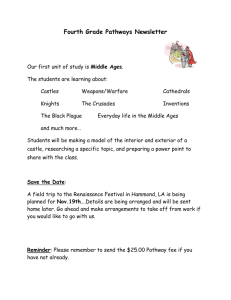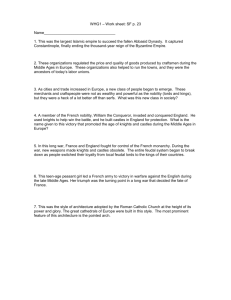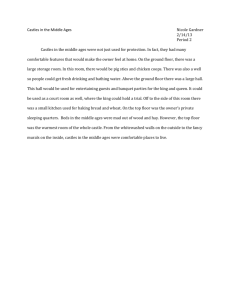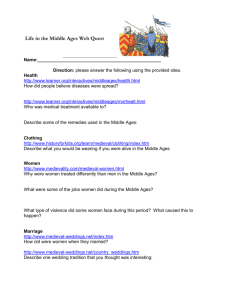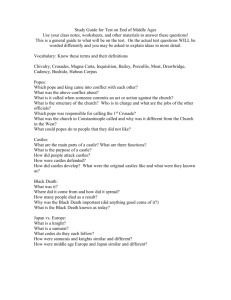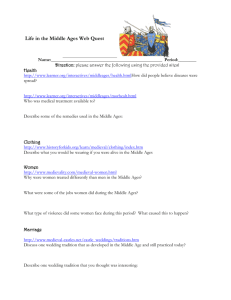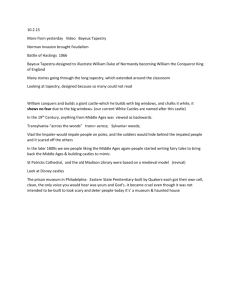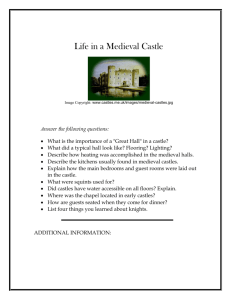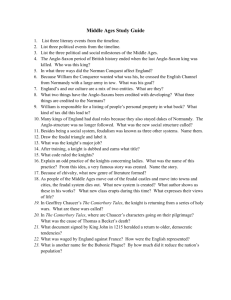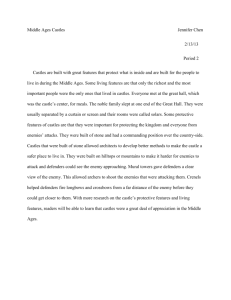Medieval Book_Girls
advertisement
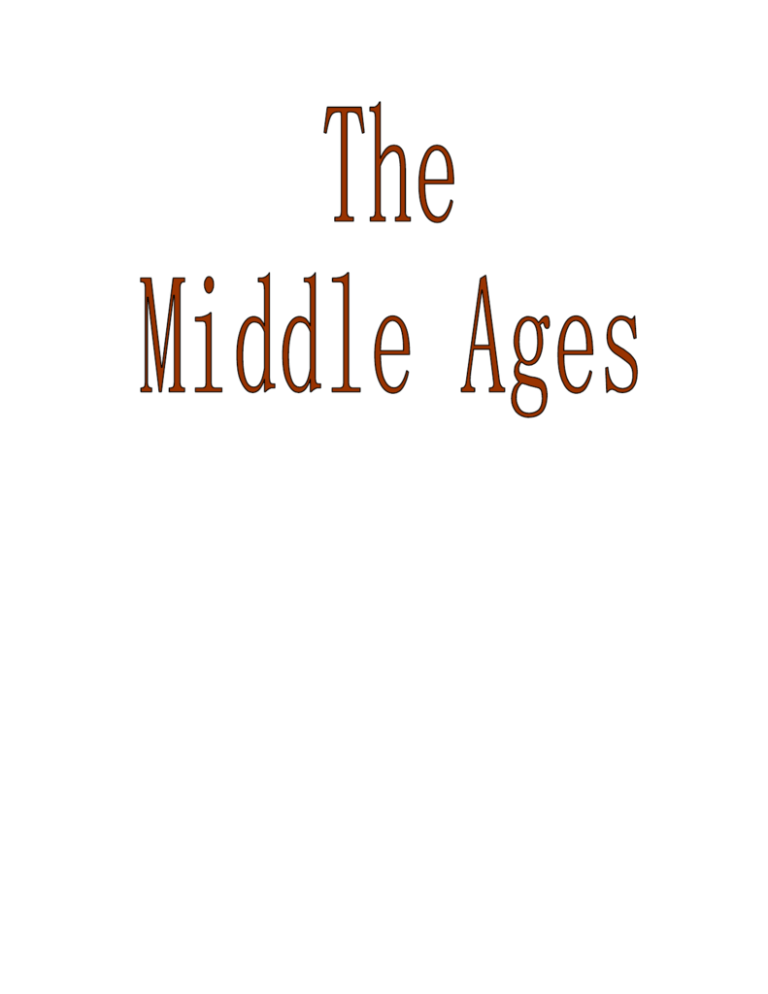
Social Structure In the middle ages the social structure was a little different then it is now in days the king could have been very powerful or not powerful and poor, their lands were divided into fufs and given to rich men and women, who were called dukes and duchess, they swore to the king that if he needed them they would help him. Their lands were divided and ruled by counts, they swore to there dukes that if they needed their help they would help. The counts lands were divided and ruled by farmers, they also swore to the counts that if they needed help they would help them. The social stricter was like a pyramid the king on the top and the farmers on the bottom. the dukes some times thought that they were just as powerful as the king and when the king asked him to do something they would ignore him, the king let it go some times but other time he started a war to get him to listen. When the king needed an army he would send the dukes out to get the counts and the counts out for the farmers and the farmers out to the village to get men for war. B(y Sarah K.) KNIGHTS IN THE MIDDLE AGES Knights were fighting men in the middle ages. They were covered with many layers of heavy armor and they could plow through foot soldiers standing in their way. There were only a few ways to become a knight. Knights were often the sons noblemen. When a boy was eight years old, he would become a page. Pages learned to fight, use weapons, ride horses into battle and their basic manners. Pages had a strict rule of conduct. A few of the page’s rules were that when they enter the lord of manner's room, they have to say "good speed" to him, they have to greet everyone, keep their head up, have an easy pace, and always bow to the lord. At the age of fifteen or sixteen, the next and second step to becoming a knight was becoming a squire. A squire was similar to the knight’s assistant. Knights could have many squires assisting them. A squire continued to learn rules, manners, and how to behave properly. His duties included dressing the knight in the morning, serving all of the knight’s meals, caring for the knight’s horse, and cleaning the knight’s armor and weapons. Finally, at the age of twenty, the man became a knight after proving himself worthy. In the middle ages, knights were usually wealthy noblemen and owned a great amount of land. The knights were wealthy because they had to pay for their protection, buy the expensive horse, armor, shield and weapons. Knights believed in the code of chivalry and behaved according to the code. Knights promised to be brave in battle, keep their promises, defend the church, and treat noblewomen nicely and with respect. Our good manners today come from the code of chivalry of the knights in the middle ages. (By Leeat) Food During the medieval times, people had to find ways how to store food without refrigerators. Instead they used barrels to store meat and fruit. Some people stored the meat and the fruit together. At a banquet you have to have proper manners. There were rules on how they should eat and where they sat. A banquet was made up of six courses. They made and stored food in different ways. For chicken, fish, and turkey for example they soaked up the blood from the meat , soaked it , dried it and stored it fin a barrel. Fruits and vegetables were pickled. They flavored the fruits and vegetables in brine or vinegar. During the winter the meat was salted in huge wooden vats. Vats are large vessels to hold things in. Some castles had honey bees to sweeten foods and drinks. Some families had water channels strait to the kitchen. Channels are a trench or a furrow. How did they make yogurt? They took regular milk and leave it on the counter on a warm day. Then it will get all lumpy. To make cheese you use different kinds of bacteria in the milk. It lasts up to four to five years. They make cheese the same way as we do today. Large castles had fish ponds, orchards,and vine yards. They use the same siverware as we do today. (by Mikela) Clothing People in the middle ages had different styles then we do today. They wore lots of animal fur and fine cloths. Just like us their style changed all the time. We don’t have that many pairs of cloths from the Middle Ages because most of them have decomposed but we know what they used to wear from paintings by artists in the middle ages. Clothing was very important because it determined your position. Most men’s clothing were very heavy! Can you imagine running around in about ten pounds of clothing. Men usually wore sported hoses and pleated skirts. Men wore leather shoes with pointy or square toes. Men wore lots of clothing. Women wore very elegant clothing. They would wear flowing gowns to the floor. They would also wear tall fancy hats. “The taller the hat the richer you are”. Women never wore pant, it was considered a disgrace. Some women would pluck their fore head to make it look taller. It was considered beautiful. Women were very modest. Children and servants wore similar clothing. They would wear stockings and tunics. The women and girls would wear sleeveless tunics and long gowns. They would also wear wimples to cover their hair. If you were wealthy you would wear different things. You would wear brighter colors, better materials, animal fur, and longer jackets. You could tell that they were wealthy. Most wealthy people also wore jewelry. They would mostly wear pins and necklaces. Nuns would wear white and black only and holy people usually wore longer jackets. The people in the middle ages dressed very differently then we do now. (by Sarah H.) Medieval Castles Medieval castles were built for the safety of a lord. People started by making castles out of wood, but they were too weak so they started building castles out of stone in 1100 B.C. around the castles were thick walls with buildings inside of them. The location of a castle was on top of a hill for protection. Around the castles were moats that contained a ditch filled with water, trapes, and sharp spikes. There was a bridge across the moat rosined and lowered for protection called the drawbridge. Behind the thick walls around the castle was a large storage space that kept the floor, wine, and gain. There is a space in the castle, the Barracks were the knights and their families lived. A passage way was built connecting the lord’s home and keeps called the great hall. Inside the castle was a chapel which was built inside the lords house or another built and it held religious services. At the gates of the castle was a gatehouse, and a building used by the guards. (by Ariel) Games and Entertainment What do you do when you are bored? Or perhaps when you want to relax or have extra time on your hands? Many of us reach for a book, others enjoy the outdoors, and some of us are plain old game junkies! Some games were created back then to benefit us now, and some we never even heard of till today. I bet we all know the game Chess or Backgammon, or Hazard. Why? Because they were played back then and have been popular over ages till now. Archery, Football, and wrestling were popular common pastimes. Little children had little dishes, whistles or dolls to amuse themselves when they weren’t working. For every age or any interest, there has always been something for everyone. At banquets for the king and queen, there would be jesters, a fool who does comedy… mummers, masked or costumed merrymakers, or acrobats and jugglers to entertain them. Royalty entertained large crowds of beautifully attired men and women at costumed balls and lavish parties, and there was always a spirit of gaiety, laughter, and fun for all. Some games, though, were not as innocent and sweet. Some were pure evil. In fact, these “games” played at festivals could and did get out of hand. A common sport or entertainment for these royal banquets was Bear Baiting. Bear Baiting was when a wild bear would be brought to the palace, have all its body defense weapons ripped out, such as their claws and teeth, and would be chained to a pole, blinded, and fight ferocious dogs without mercy. Spectators lived for this excitement, to see who would survive the horrifying struggle. So there, you have it, the ups and downs of entertainment for our ancestor’s way back. (By Mushkie) Crusades Three very strong religions claimed the holy city of Jerusalem. The Jews wanted it because their holy temple created by Solomon was located there, and G- d had promised it to them. The Muslims claimed it because Mohammed ascended to Heaven from the holy city. They also believe that G-d promised it to them through Ishmael. The Christians claimed it was theirs because Jesus was crucified in that very city, and he ascended to heaven from there as well. In 600 CE the Arabs conquered Jerusalem and took complete control. For years Jews and Christians were allowed to enter, and live in the holy city as long as the obeyed the law. In 1905 the Arabs closed the city to all the Christians and Jews. This made both the Christians and the Jews extremely upset. The pope decided that he would have none of it gathered a group of 30,000 Christian men and and started his first crusade. The crusade’s goal was to recapture the holy city of Jerusalem. The crusade’s symbol was the Red Cross. Their flags, uniforms, armor etc. had a red cross somewhere located on it. The Christians had captured Jerusalem but not for long. Less than 50 years later the Arabs recaptured Jerusalem once again. The Pope still had not given up, he sent another group of crusaders who conquered Jerusalem in 1147, and fell in 1149. Jerusalem now yet again was in the hands of the Arabs. Another group of crusaders was on their way to reconquer Jerusalem. They had successfully captured 1189, and in 1192 it was re-conquered by the Arabs! The 4th crusade group had different intentions. They attacked Constantinople and stole all the Arab goods so they would have enough money to attack the Arabs in Jerusalem. This went on from 1202-1204. In 1212 German and French children started a crusade believing that because they were children G-d would help them. They were wrong and that cost many of the children their lives. These unsuccessful crusades continued for 70 years. In the year 1291 the Christians had given up, and stopped sending crusaders. (By Sapeer) Accomplishments in the Middle Ages The middle ages had many accomplishments, some which we still use, while others are old but still brought something for us today. Justin's Code was one of the many accomplishments in the Middle Ages. When King Justin became king he made a few laws which were called the Twelve Tables. Justin's Code saved all the old laws and put in new ones. One of the examples is a person is innocent until proven guilty. Trade was another one of the accomplishments. When the crusades returned home they brought back with them silk, food, and just about anything else. The people had a question, how could they get these items. The answer was trade. To trade you needed good ships that would carry your purchase, people to do the trading, you needed storage, something that you could trade and a market place to sell your items. Big castles were first built in the Middle Ages. The reason for these castles was for the protection for the Lord for he always wanted a way to defend himself. The castles were built to defend. They were first made out of wood but they were to easy to burn so later on they started building them out of stone. They were usually built on top of hills so that the guard could see the people as they walked into the castle and were able to defend themselves better. Guilds was a great accomplishment for the people in the middle ages. Guilds would allow people to have space between another person with the same job and so nobody with the same job could come and take over another person's job. Guilds also gave parties for the members. The guilds also had very strict rules that you needed to follow. Stained glass is all over nowadays and was one of the accomplishments in the Middle Ages. Many people in the Middle Ages wanted the most beautiful cathedral and so they put colored glass as windows. The windows told religious stories and helped the people because not a lot of people could read so they would allow people to know about their religion. The plow was first discovered in the Middle Ages but as time went on it got bigger and better. In the Middle Ages the plow helped planting become much easier. The plow would go deep in the soil, and would make deep line of furrows and would push the soul off to the side. They put the seeds into the whole and water would run through the furrows and the crops would grow. By BasSheva
